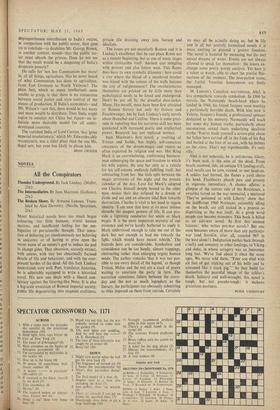NOVELS
All the Conspirators
Mos.'. historical novels have too much bogus colouring, too little humour, trivial human motives, and insufficient feeling for the am- biguities of pre-scientific thought. That sensa- tion of believing yet simultaneously not believing in unicorns; or of having to prise open the secret name of an enemy's god to induce the god to change sides. That obsession, scarcely extinct, with omens, with tiny but abnormally focused details of life and behaviour, and with the ever- present hordes of the dead. All this Jack Lindsay understands very well. Poet, translator, historian, he is admirably equipped to write a historical novel. His new one deals with a liberal con- spiracy against the Goering-like Nero. It is also a big-scale evocation of Roman imperial society, public life degenerating into stagnant craftiness,
private life draining away into fantasy and idealism.
The issues are not peculiarly Roman and it is Lindsay's excellence that he can place Rome not as a remote beginning, but as one of many stages within civilisation itself. Ancient east mingling with present and also future west. This Rome does have its own symbolic dilemma : how could a city where the blood of a murdered brother was mixed with the cement of the walls become the city of enlightenment? The revolutionaries themselves are pricked on by little more than pathological needs to be loved and endangered. Don't be put off by the dreadful dust-jacket. Many, like myself, must have been first attracted to Roman history not only by Graves and Feuchtwanger, but by Jack Lindsay's early novels about Hannibal and Catiline. There is some grati- tude in reporting that his narrative skill has been quickened with increased poetic and intellectual power. Research has not replaced instinct.
Jean Macvean's first novel, a resetting of Tristan and Isolde, has highly self-conscious awareness of the dream-magic and excess so often exploited by religion and war. Her King Mark is an overwhelming, conforming business- man submerging the space, and freedom to which his wife aspires. He sees her only as a vehicle for his self-esteem, endlessly fulfilling itself, but subtracting from her. She feels split between the magic territories of the night and the prosaic calendar of the day. Love for Mark's adopted son Charles, himself deeply bound to the older man, makes their day eclipsed by a dream of Castle and sea and an obscure tidal flow towards destruction. Charles is vital. to her need to regain identity. 'I am sure that love at its most intense disturbs the deepest powers of life. It can pro- vide a lightning conductor for white or black magic. It is the most important mystery of our existence and we've hardly bothered to study it. Mark understood enough to take me out of the dark. but not enough to lead me towards the light, which would have meant rebirth.' The hazards here are considerable. Symbolism and coincidence can be too handy, almost trappings, obstructing rather than enlarging urgent human needs. The author remarks 'that it was not pos- sible to use every detail of the legend,' as though Tristan, Meloc and the rest are a stack of guests waiting to entertain the party in turn. The narration sometimes falters between the every- day and the not so mall legendary as the literary, the participants too obviously submitting to r8les imposed on them from outside. Certainly
we may all be actually doing so, but in life and in all but severely formalised novels it is more exciting to pretend a greater freedom. The novel is haunted by menacing but (to me) unreal dreams of water. Events are not always allowed to speak for themselves: the lovers ex- change some pretty wordy analysis. Yet here is a talent to watch, able to chart the precise fluc- tuations of the moment. The love-potion scene, the fretful Venetian honeymoon are finely managed.
M. Lanoux's Canadian war-veteran, Abel, is less sympathetic towards symbolism. In 1960 he revisits the Normandy beach-head where he landed in 1944, his friend Jacques soon meeting a particularly horrible death. With him now is Valerie, Jacques's fiancee, a professional spinster dedicated to his memory. Normandy will teach her some dry human truths, particularly about unconscious sexual fears underlying idealistic myths. 'You've made yourself a screen-play about the fallen hero carried off in the folds of his flag and buried at the foot of an oak, with his helmet on the cross. That's not reprehensible, it's only silly.'
Abel is not unheroic, he is anti-heroic. Glory, it's been said, is the sum of the dead. From beach, seaweed, tide, an antique US landing-craft, total recalls can be torn, coaxed, or met head-on. A soldier had burned, the flames a yard above his head. Flashbacks pleach past and present in vigorous immediacy. A chance affaire, glimpse of the sinister side of the Resistance, a swastika tarred on the war memorial, a muttered 'They've poisoned us with Liberty' show that the indifferent 1960 Normans, ostensibly idling on the beach, are still locked in a process as dispiriting as the war itself. At a given word people can become monsters. This book is billed as an anti-war novel. At first this seemed fatuous: who writes pro-war novels? But one soon becomes aware of more than any particular war (and Sorokin, after all, counted 967 in the west alone!). Indignation pushes back through cruelty and cemetery to other landings, to Viking . and duke, in whose savagery was an innocence long lost. 'We've lied about it since the stone ages. We never told them, "Your son died with six feet of gut sticking out of his belly and he screamed like a stuck pig."' So they build for themselves the peaceful image of the soldier's death. Salutary and well-wrought, this novel is tough, but not pseudo-tough: it eschews gratuitous nastiness.
PETER VANSITTART






























 Previous page
Previous page